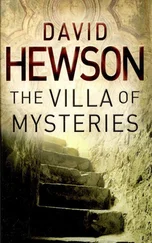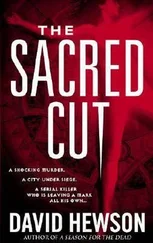“Why is the city involved?” he asked now. “You look like someone who can afford it.”
“Appearances can be deceptive,” Massiter replied. “Wealth and debt go hand in hand. None of this is without self-interest, naturally. Six months ago, certain people in the city and the regional authority approached me to help. There’d been potential buyers before, but none of them met the Arcangeli’s approval. There is a limit to how much good public money can be thrown after bad. The Arcangeli aren’t the easiest of people to deal with, but eventually I managed to strike a deal to buy the island lock, stock and barrel, provided I rent the foundry and part of the palazzo back to them on a peppercorn rent to get them back on their feet. After which, I open the gallery, perhaps, build a few apartments in the rest of the place to pay for it all, and add another tourist attraction to bring in more hordes for the Venetians to fleece. It’s not just money, though, not from my point of view. I hate seeing traditions founder simply because they’re badly run. The glass is exquisite, if a bit unfashionable. With a little help they could make a go of it, once they free themselves of debt. And we take over the running of the island. Which is where—”
“They don’t need the details,” Randazzo interrupted. “It’s none of their damn business.”
Massiter flashed the commissario a sharp look, one that silenced him. “What does it matter, Gianfranco? If they don’t do their job, all this goes public anyway. And God alone knows what happens then.”
The speedboat docked at the jetty. Massiter barked at the helmsman to tie up, allow Falcone and his men to disembark, then return to the city. Costa glanced up at the extraordinary glass structure fronting the mansion. There was a figure at the windows. A woman—tall, erect, with long dark hair and a pale face—was watching their arrival intently.
“I am,” continued Massiter, “at an awkward juncture in this negotiation. The lawyers have been bleeding us dry. The deal is still unsigned. The public purse is empty. It’s only my rental of the hall that keeps them afloat. This damned island’s covered by all manner of trusts and covenants. It’s taken us months just to go through the fine print. Now . . .” A morose frown briefly broke the handsome cast of his face. “ . . . we have to close or walk away. I have until the end of next week to bring this negotiation to a conclusion or my backers will look to place their money elsewhere. Nor can I blame them.”
Falcone stared at Randazzo. “So we’re doing this in order to expedite some private financial transaction of his?” he said.
It was Massiter who answered. “In a sense, but with good reason. If you can just write up that report to say Uriel killed his wife—which we’re all assured is the only possibility—then the contract can go ahead. Since you’re experienced detectives, and from Rome too, not hereabouts, no one will question it. Alternatively . . .”
“I don’t care about your business affairs, Mr. Massiter,” Falcone declared. “They’re nothing to do with us.”
Randazzo stabbed out his cigarette in the silver ashtray between them. The smell of dead tobacco mingled with the fire smoke from the jetty above.
“They’re everything to do with us,” the commissario declared. “If this case is still open by the end of next week, then it can only say to the outside world that we consider one of the other Arcangeli to be a suspect. No one else was on the island. However ridiculous that is—and hear me, Falcone, it is ridiculous—it kills Signor Massiter’s contract stone dead. In order for that to proceed, all three living Arcangeli must sign. If they do, and one is then charged with the murder of Uriel Arcangelo, all manner of civil proceedings could follow that might throw the entire contract into jeopardy. These people are drowning in debt. There’s any number of shark lawyers out there who’d leap on a criminal charge as an excuse to try to void the contract and seize the property direct. Or blackmail Signor Massiter for more money he doesn’t have in return for keeping quiet. The negotiations are fragile enough as it is. Any doubt about future litigation would end them for good. No investor would take that risk. The case has to be closed or the Arcangeli go into liquidation next week and . . .”
He didn’t want to go any further. Falcone leaned back in his seat and shook his head.
“I repeat,” the inspector said, “I don’t care.”
Massiter nodded at the man beside him. “You have to tell them, Gianfranco. What’s there to lose?”
The commissario swore bitterly, then lit another cigarette before continuing. “This isn’t about business. It’s about politics. You three of all people should know that’s not a place to make enemies. In your case, more enemies.”
They were on probation. Costa understood that as well as Falcone and Peroni. It didn’t make them anybody’s fools.
“We’re listening,” Costa said.
“Jesus,” Randazzo hissed, flashing Falcone a grimace. “You smug bastards really think you’re a team, don’t you? All for one, one for all. Wise up. Do you think you’re untouchable because of that? Listen to me. The Arcangeli have been bankrupt for years. Five at least. Probably more. They’ve managed to stay afloat because they’ve been working their way through some influential friends. If you know the right people here, you’d be amazed how easy it is to dip your beak into the public purse. They owe millions in taxes going back a decade. They’ve been quietly getting subsidies from everywhere to keep that stupid place running, even though it’s just a museum that’s no longer even fit to open its doors to the public. The cultural people have paid. The historical commissioners have paid. The city, the region. They’ve all been sweet-talked by the Arcangeli into stumping up cash on the promise that sometime soon it would all come right.”
“And I guess a little went back into some private pockets?” Peroni suggested. “Is that what we’re talking about here?”
“Maybe,” Randazzo snapped. “Maybe not. Nothing comes for free anywhere, does it? Or don’t you have kickbacks in Rome? Are you people all just too high-minded for that?”
Falcone scowled. “ We are.”
“Well, that’s your privilege. But let me say this. If the Arcangeli go down, then this city suddenly has a hole in its books the size of the lagoon. They can’t keep it quiet any longer. There’s just too much money at stake. If it goes to some kind of judicial inquiry—and it would—then all manner of decent people are going to find themselves standing in the dock, or worse.”
Peroni raised a battered eyebrow. “Decent?”
“Don’t preach to me!” Randazzo yelled. “You don’t belong here. You don’t know how we work.”
Massiter leaned forward and tapped the commissario lightly on the knee. “No need to lose your temper,” he cautioned. “These are practical men. They know which side their bread’s buttered.” The Englishman eyed them. “Don’t you?”
Falcone took out his notepad, scribbled something on it, tore off the sheet and tossed it into Randazzo’s lap.
“There’s my signature,” he said. “Write the report and stick that at the end. Then we can all go home.”
“No!” the commissario bellowed. “I need you to do this. You’re outsiders. You’ve got background. No one’s going to argue with what you say. Uriel Arcangelo killed his wife. We know that. I’m not asking you to bend the evidence or sign off on anything you don’t believe. The facts are there. I just want them put down on paper. You’ve got a week. Then . . .” He gestured towards the lagoon and the cloudless blue sky. “Then you’re gone. Do we have a deal?”
Читать дальше












